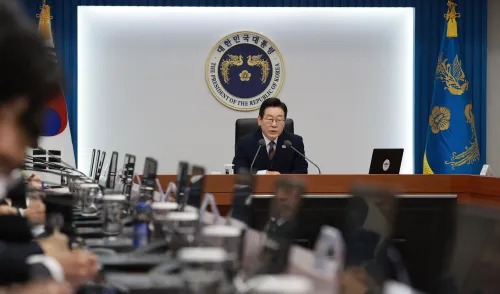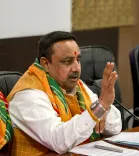Senate Foreign Relations Committee Unanimously Approves Marco Rubio's Secretary of State Nomination

Synopsis
Key Takeaways
- Senate Foreign Relations Committee voted 22-0 in favor of Rubio’s nomination.
- Rubio is expected to be confirmed as the first Latino Secretary of State.
- His nomination reflects bipartisan support amidst a divided Congress.
- Rubio has a long-standing background in foreign policy, particularly regarding China.
- Procedural hurdles could delay the confirmation of other nominees.
Washington, Jan 21 (NationPress) The Senate Foreign Relations Committee approved Marco Rubio's nomination as Secretary of State late Monday with a unanimous vote, paving the way for a floor vote on his confirmation expected later that evening.
Rubio, the outgoing senior Senator from Florida, garnered bipartisan support from committee members, where he previously served as a senior member. The vote concluded at 22-0.
This marks the first nomination to receive approval from a Senate committee, anticipated to be the sole one voted on during Inauguration Day.
Among Trump's nominees, Rubio stands out as one of the least contentious, positioning him to potentially be the first confirmed. Another nominee, John Ratcliffe for CIA director, is also expected to face a quick vote.
Two additional nominees for pivotal national security roles, Pete Hegseth for defense secretary and Kristi Noem for homeland security secretary, are also likely to receive committee approval on Monday evening.
Following his oath of office, President Trump formally presented a list of top nominees to the Senate on Monday noon.
"Marco Rubio is a highly intelligent individual with an exceptional grasp of American foreign policy," noted Senator Chuck Grassley of Iowa, the most senior Republican, at the chamber's opening.
Grassley anticipates Rubio will achieve "an overwhelming vote for his confirmation."
Traditionally, the Senate convenes immediately after the inauguration ceremony to start assembling the new President's team, particularly national security officials.
During Trump's first term, the Senate promptly confirmed his defense and homeland security secretaries on day one, while President Joe Biden's choice for director of national intelligence was confirmed on his own Inauguration Day.
With Trump back in the White House and his Republican Party holding majorities in Congress, his outsider Cabinet selections are beginning to take shape despite initial skepticism and opposition from both sides.
Senate Majority Leader John Thune expressed on Monday evening that voting on Trump's nominees is expected to begin "imminently."
Democrats believe it’s more advantageous to project a willingness to cooperate with Trump rather than simply obstructing his nominees. They are reserving their opposition for other picks with less support, such as Tulsi Gabbard for director of national intelligence and vaccine skeptic Robert F. Kennedy Jr. for health secretary.
Senate committees have been conducting extensive confirmation hearings on over a dozen Cabinet nominees, with more hearings scheduled this week. Several panels are anticipated to convene late Monday to move forward with voting on nominees for full Senate confirmation.
The Senate Foreign Relations Committee, Senate Armed Services Committee, and Senate Intelligence Committee are all set to hold evening meetings to advance the nominations of Rubio, Hegseth, and Ratcliffe.
Rubio, a popular senator and former rival of Trump during the 2016 presidential race, has grown closer to the President in recent years. He appeared before the Foreign Relations Committee last week to respond to questions, having served on the panel for over a decade.
If confirmed as Secretary of State, Rubio would become the nation’s top diplomat and the first Latino to hold this position. Born in Miami to Cuban immigrants, he has a long history of involvement in foreign affairs, especially in South America, and has positioned himself as a hawk regarding China's ascent.
During his confirmation hearing last week, Rubio cautioned about the ramifications of America's "unbalanced relationship" with China. While he shares Trump’s anti-globalist sentiments, Rubio is also viewed as an internationalist who recognizes the importance of U.S. engagement on the global stage.
Rubio is expected to secure bipartisan backing from both Republicans and Democrats. He would succeed outgoing Secretary of State Antony Blinken, who has expressed hopes that the Trump administration will continue Biden’s Middle East policies aimed at resolving the Gaza conflict and assisting Ukraine counter Russian aggression.
With the Senate divided 53-47, Republicans require nearly unanimous support from their party members to counter Democratic opposition to nominees.
Any objections from a single Senator, anticipated with Hegseth and several other selections, could necessitate procedural actions that would postpone voting into the following week.









